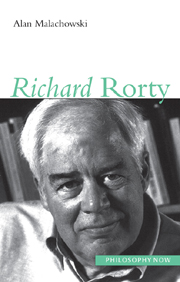1 - Platonic yearnings
Summary
‘Platonism’ in the sense in which I use the term does not denote the (very complex, shifting, dubiously consistent) thoughts of the genius who wrote the Dialogues. Instead, it refers to a set of philosophical distinctions (appearance–reality, matter–mind, made–found, sensible–intellectual, etc.): what Dewey called ‘a brood and nest of dualisms’. These dualisms dominate the history of Western philosophy, and can be traced back to one or another passage in Plato. Dewey thought, as I do, that the vocabulary which centers around these traditional distinctions has become an obstacle to our social hopes.
(PSH: xii)I wanted very much to be some kind of Platonist, and from 15–20 I did my best. But it didn't pan out.
(WO: 9)Richard Rorty's philosophical career is epitomized by the tensions between these two quotations. He is frequently depicted as an analytic philosopher, originally of no mean talent, who unfortunately strayed from the fold to become, in Jonathan Rée's catchy phrase, “the bad boy of American philosophy” (Rée 1998: 7). This common characterization tends to trap Rorty in an incessant crossfire. For many philosophers now strenuously maintain that he strayed too far – beyond, even, the bounds of academic respectability. Then there are others, equally vocal, who continue to claim that Rorty did not stray nearly far enough, that, while still hostage to an outmoded and politically suspect analytical agenda, he is far less ‘bad’ than he ought to be.
- Type
- Chapter
- Information
- Richard Rorty , pp. 23 - 36Publisher: Acumen PublishingPrint publication year: 2001



